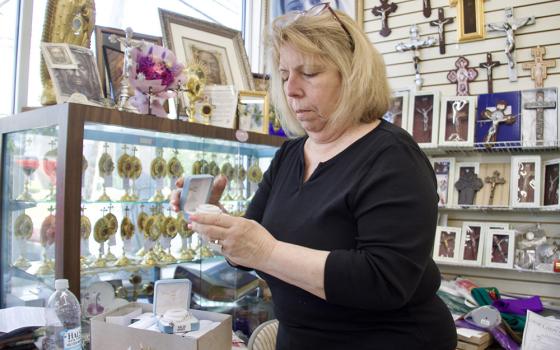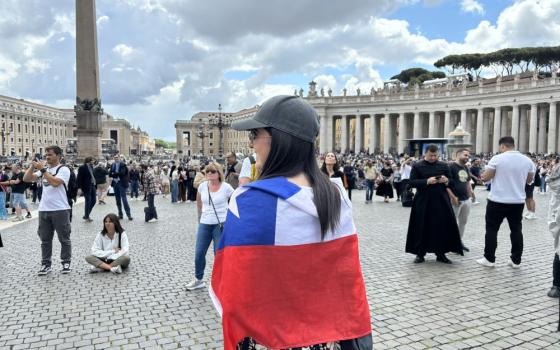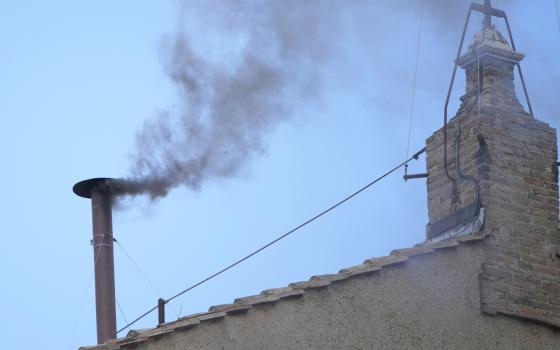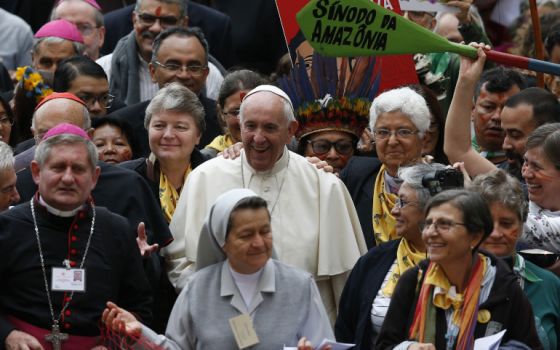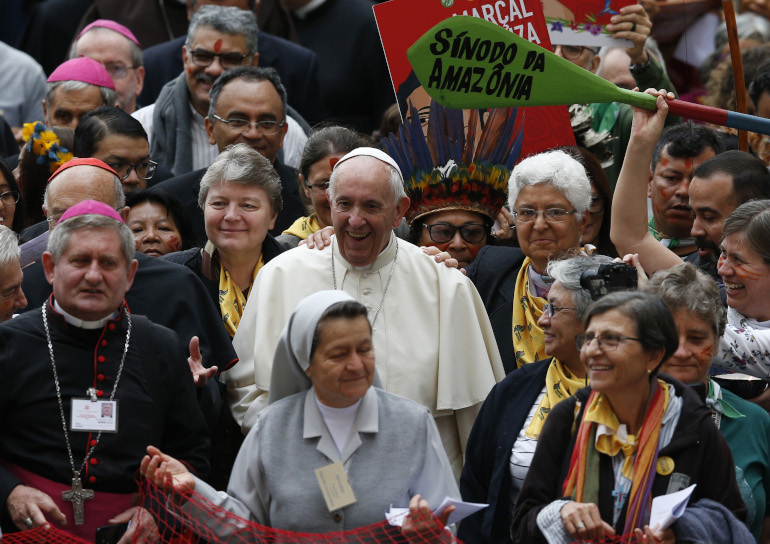
Pope Francis walks in a procession at the start of the first session of the Synod of Bishops for the Amazon at the Vatican Oct. 7, 2019. (CNS photo/Paul Haring)
Catholic sisters hoping that the new pope would continue Pope Francis’ efforts to make the church less clerical and more inclusive of lay people may have had that prayer answered with the selection of the first pope from the U.S., Cardinal Robert Prevost, now Pope Leo XIV.
Prevost, 69, has been a vocal proponent of Francis' emphasis on synodality, which emerged early in the conclave as an important issue to a significant bloc of cardinals who can vote in the conclave.
In a 2023 Vatican News interview, Prevost connected synodality — efforts to make the church's structures more inclusive and participatory — to addressing the polarization currently gripping the church. Another plus on Provost’s resume: His background in canon law might provide some comfort to synod skeptics who are concerned that it could pose threats to the church's tradition.
Catholic sisters who were involved in synods during Francis' papacy believe there's no turning back — even with a new pope.
Synods are worldwide, grassroots conversations in which lay and religious Catholics discuss how the church can better meet them where they are, with the process beginning in parishes and then at the diocesean, national, and eventually global level, culminating with summits in Rome.Pope Francis sought to make the church less clerical and more participatory for laypeople; the question now is whether his successor will, too.
Women religious told Global Sisters Report that they think the late pontiff's commitment to dialogue was sufficiently deep-rooted to continue into the next papacy, as during Francis' papacy, he held synods on the family, youth, the Amazon, and synodality.
Sr. Nathalie Becquart, undersecretary of the Vatican's General Secretariat of the Synod of Bishops, called the landmark process "one of Pope Francis' most profound and transformative legacies for the church."
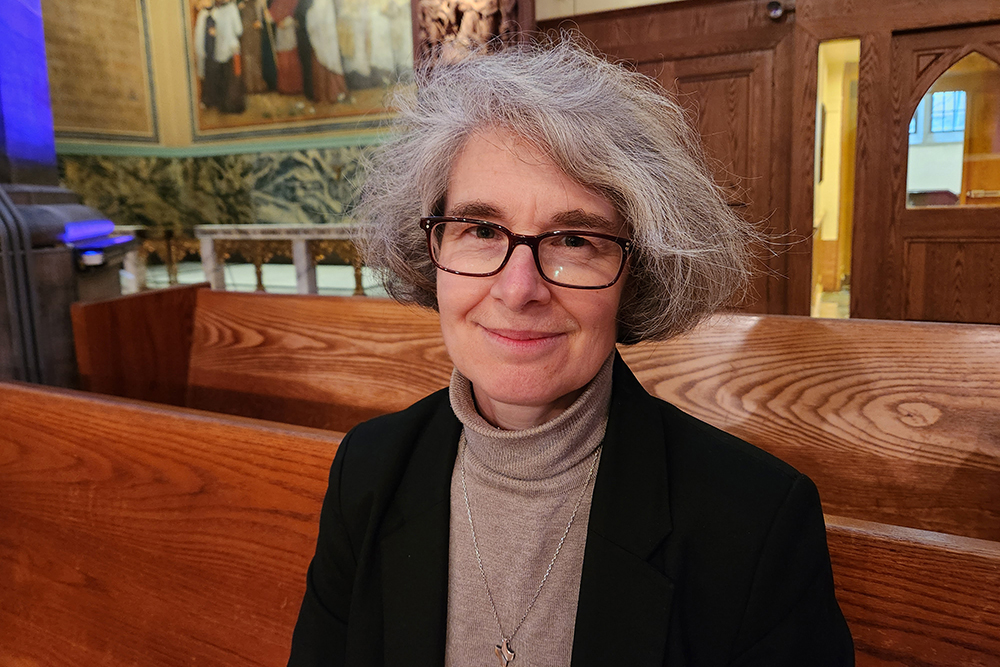
Sr. Nathalie Becquart, undersecretary of the Vatican's General Secretariat of the Synod, told GSR in a March 28, 2023, interview at a Manhattan church that she would vote during the October Synod of Bishops on synodality. (GSR photo/Chris Herlinger)
The many synods that began during his papacy were a response to the "longings of so many, from religious sisters and lay faithful to bishops and cardinals," said Becquart, who participated in the 2021-2024 Synod of Bishops on synodality. And she believes this heritage "will continue to bear fruit as a 'Spirit-led' process, renewing ecclesial life and mission in ways that authentically communicate the Gospel to our contemporary world."
Now, as the cardinals gather in Rome for the papal conclave, concerns arise about continuing and furthering the late pontiff's vision of synodality.
To Becquart and others, that vision is crucial.
The genuine dialogue across differences "engaged with contemporary realities," she said, and was "responsive to the Spirit's guidance through diverse voices, especially those at the margins," said Becquart, a French Xavière sister.
Through the synodal process, "Francis guided the church into a deeper reception of the Second Vatican Council," she said. "Synodality has emerged throughout his pontificate as a retrieval of the early church's communal character and as the unfolding of what is fundamentally a constitutive dimension of the church."
How to use this database: Hover over each cardinal to learn more about him. A green dot next to an issue indicates the cardinal has expressed support for positions and teachings that generally align with those of Pope Francis. A red dot indicates disagreement with Francis' stances, and a gray dot means the cardinal's position is unclear.
Potential for deep change within the church
Irish theologian Sr. Maeve Heaney agreed and said that if the next pope "is capable of continuing to accompany the church into doing things synodally, as is our ancient heritage," Francis' legacy will continue to flourish.
"It's not a theme, but it's a way of doing things. I think it has the potential to change things a lot more deeply as to how the church works."
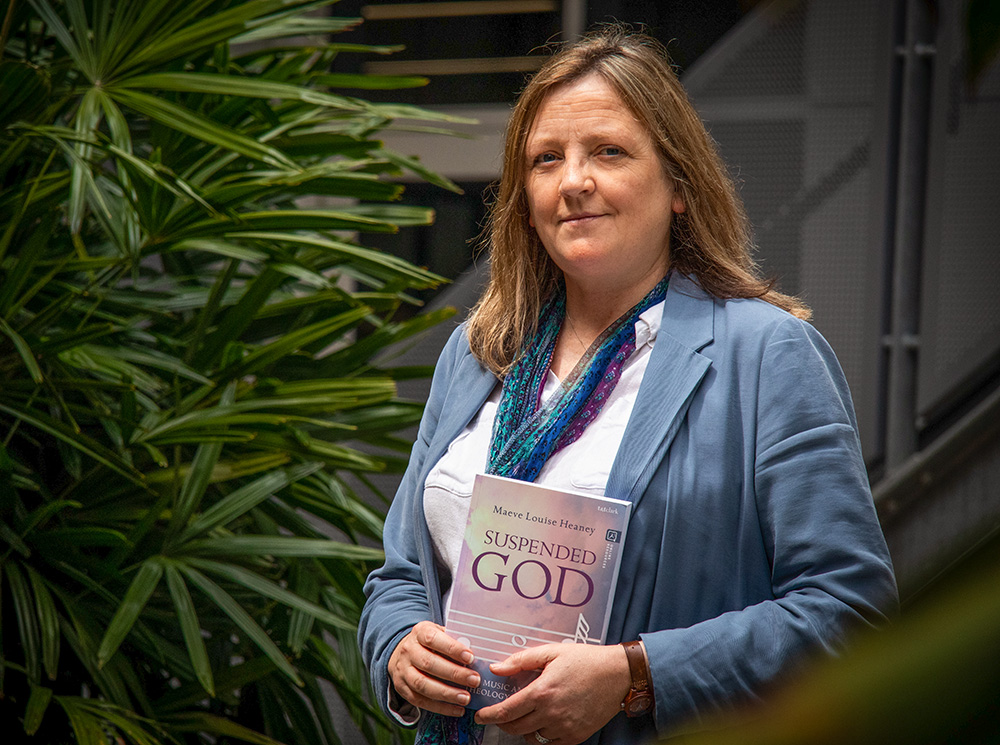
Australian Catholic University theologian Sr. Maeve Heaney, Verbum Dei, with a copy of her book Suspended God: Music and a Theology of Doubt (Courtesy of Australian Catholic University)
She said while it was disappointing "for some people that certain themes got taken off the table in the synod on synodality" — such as the diaconate for women or further discussion of inclusion of the LGBTQ community in the church — "the discernment process, the method, the fact of having people around the table was more important than the specific conclusions."
"That teaches us something. I think the method is what's important, because if you're interacting with people, then you're getting people around the table 'walking' together," said Heaney, a member of the Verbum Dei Community who teaches at Australian Catholic University in Brisbane. "I pray, I really do hope, that we're capable of holding that space."
'It's not a theme, but it's a way of doing things. I think it has the potential to change things a lot more deeply as to how the church works.'
—Sr. Maeve Heaney, Irish theologian
Sr. Maria Cimperman, the synodality coordinator at the International Union of Superiors General, or UISG, who helped promote synodality within consecrated life, said she feels Francis did not expect a "perfect outcome" to the Synod of Bishops on synodality.
Rather, he was "comfortable with the church walking together, listening to the Spirit in each context," said Cimperman, a Religious of the Sacred Heart of Jesus. "He wanted us to have the freedom to communally discern and try it, live into this call of spiritual renewal that also asks for structural reform."
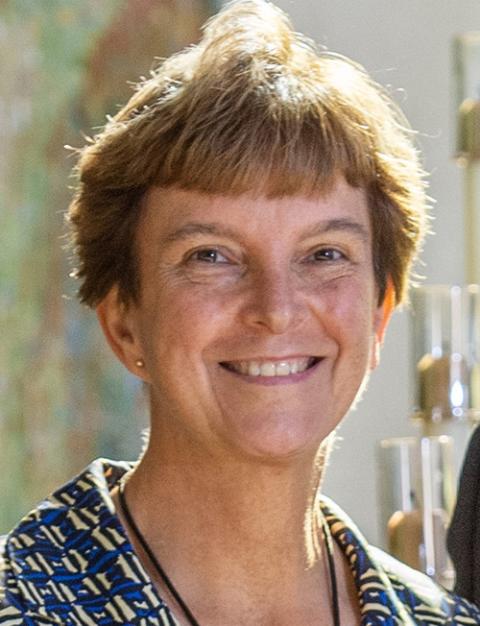
Sacred Heart Sr. Maria Cimperman (Courtesy of Bryon Photography)
Synodality, she said, was a "natural movement," a manifestation of his vision articulated in his 2020 encyclical Fratelli Tutti.
The synod assemblies were an experiment that asked, "Can we live together this way of communal discernment? Can we together learn to dialogue? Can we build relationships?" said Cimperman, who also teaches theological ethics and consecrated life at the Catholic Theological Union in Chicago.
Sr. Carmen Sammut, the former president of UISG, said she hopes Francis' successor will build on his appointment of women in the Vatican dicastery in decision-making positions, as well as holding to his decision that "women religious be automatically part of synods, in the same way that men religious are."
"We hope that his successor will continue to expand on this, to the benefit of the whole church."
She noted that Francis acted on appointing women to the synod after listening to women religious. Sammut, a member of the Missionary Sisters of Our Lady of Africa, added that in meeting the late pontiff numerous times she saw "how much he valued religious women and our work beyond the boundaries of the church in interreligious settings and with those who are at the margins of society."
'No putting the genie back in the bottle'
Mary Kate Holman, who teaches religious studies at Fairfield University, a Jesuit institution in Fairfield, Connecticut, said the synod on synodality was a bit of a paradox: Those who thought the final vote at the synod would bring immediate change to the Catholic Church, she said, were disappointed that nothing seemed to happen, while those who understood how the process actually works say it may have changed everything.
"I think synodality is more radical than most people give it credit for," said Holman, whose scholarly work includes research on Francis and synodality.
"Just the idea that the church and the synod would function as a consultative body, and that it would include not just bishops but laypeople as well, is a dramatic culture shift."
Holman said for the church to move from a culture of secrecy and cover-up to a church that listens and encourages its members to speak openly and frankly is a much bigger change than single issues such as women deacons.
"If that culture shift is to really take place, that could be more radical than the pope making individual decrees," she said.
But with Francis' death and the election of a new pope who may not continue the push for synodality, that culture shift could be short-lived, Holman said.
'Just the idea that the church and the synod would function as a consultative body, and that it would include not just bishops but laypeople as well, is a dramatic culture shift. ... If that culture shift is to really take place, that could be more radical than the pope making individual decrees.'
—Mary Kate Holman, who teaches religious studies at Fairfield University
"I'm cautiously optimistic," Holman added, noting there is "no putting the genie back in the bottle."
Of course, it's not only up to the pope, Holman said, citing the way some bishops embraced synodality in their dioceses while others barely paid lip service. The next phase of the synodal process calls for synodality efforts at the local level, she said, which is another chance for those opposed to it to let the process die. And whether the final gathering in Rome even occurs — it was planned for 2028 — is up to the next pontiff.
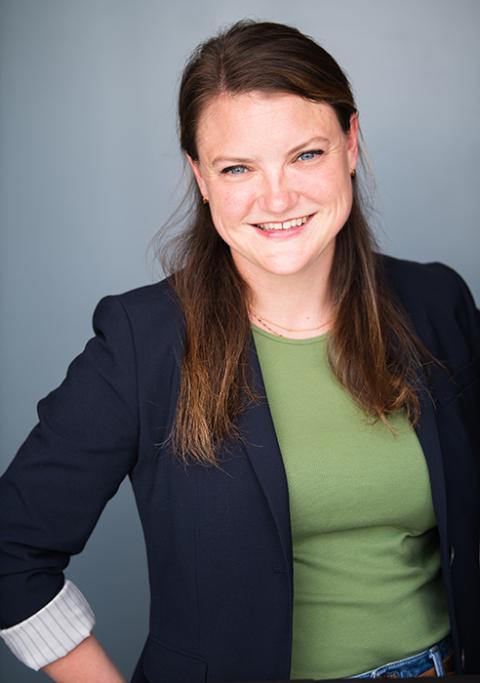
Mary Kate Holman (Courtesy of Fairfield University)
Holman said there has always been a tension between the bureaucratic structure of the church and listening and responding to the Holy Spirit. Synodality, she said, is about creating a structure that allows listening to the Holy Spirit.
Francis repeatedly emphasized the need to be a listening church, Holman said, even when voices are frank and open. Hearing those voices — some of whom have historically never been heard in the Catholic Church — means hearing the Holy Spirit, as well.
"That's the pastoral character of his papacy," she said. "All this bringing new life to the church, is that something the bishops want to continue? I hope so."
Becquart hopes so, too, noting that the "synodal style" was on display during Francis' final days "as he expressed his desire to remain among the people as a synodal pastor until the end."
"The profound response — people of all ages, social positions, vocations, and genders walking together toward St. Peter's to honor him and pray — embodied this vision," she said, adding that the diverse crowds united at his funeral "manifested the living expression of a synodal church."
Advertisement






